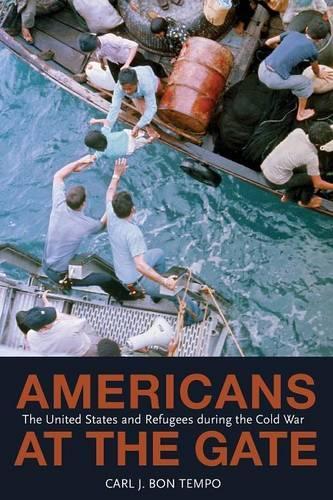
Americans at the Gate: The United States and Refugees during the Cold War
(Paperback)
Available Formats
Publishing Details
Americans at the Gate: The United States and Refugees during the Cold War
By (Author) Carl J. Bon Tempo
Princeton University Press
Princeton University Press
1st September 2015
United States
Classifications
Tertiary Education
Non Fiction
Migration, immigration and emigration
Immigration law
Cold wars and proxy conflicts
325.21097309045
Physical Properties
Paperback
288
Width 152mm, Height 235mm
425g
Description
Unlike the 1930s, when the United States tragically failed to open its doors to Europeans fleeing Nazism, the country admitted over three million refugees during the Cold War. This dramatic reversal gave rise to intense political and cultural battles, pitting refugee advocates against determined opponents who at times successfully slowed admissions
Reviews
"The author is adept at unraveling the complex underpinnings and evolution of this postwar 'American identity,' utilizing an impressive range of archival and published sources... For those specializing in post-WW II US history, this is an essential contribution."--K.A. Tyvela, Choice "Carl J. Bon Tempo has done a solid overall job of examining the acceptance of refugees into the US during the Cold War. His book is concise and historically accurate... It deserves consideration by scholars of human rights, migration, and foreign policy. It provides a good base for dispersing information and facts to students as well and should be useful in undergraduate courses for this purpose."--Samuel S. Stanton, Jr., Law and Politics Book Review "In the post-war period, the United States admitted millions of refugees. In this ambitious book, Carl J. Bon Tempo set out to explain how and why this new American approach to refugee affairs developed and evolved between the early 1950s and the late 1980s. In doing so, the author decided to go beyond foreign policy imperatives to confront a multiplicity of factors, weighing the evolution of their relative significance. Set in the Cold War context, the impact of anticommunism at home and abroad constitutes the main element of this study. Indeed, the propaganda value of accepting refugees fleeing communism remained central to US policy and manifest in the persistence of the 'refugee equals European anticommunist' equation. Bon Tempo's study of how this equation evolved and receded--without totally disappearing over the period--is a major contribution of this book."--Cold War History "Carl Bon Tempo's new book offers a new perspective... By placing the overlapping and intertwined problems and dichotomies of the Cold War, human rights and, to a lesser extent, the Civil Rights movement as part of American refugee policies, this book deserves to be read."--Mario Menendez, Revue Francaise d'Etudes Americaines "This book is a superb introduction to the history of U.S. refugee politics and policy and an important contribution to American civic education."--Karen Jacobsen, Journal of American Ethnic History
Author Bio
Carl J. Bon Tempo is assistant professor of history at the State University of New York at Albany.
